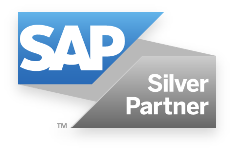7 ways cloud ERP can benefit your business

We think cloud ERP could be better for your business than an on-site solution. Why? Because of all these great benefits you could take advantage of…
We recently talked about how cloud ERP is the better option versus on-premises software. But today we wanted to really hammer home the benefits you stand to gain from moving into the cloud.
Why?
Because cloud ERP is the future of business. It’s one of the fastest growing software markets, with stats showing a 15% increase in take-up rates between 2017 and 2018alone. And in the next three years it’s suggested to become an industry worth nearly US $30 billion.
It’s only a matter of time before you decide to adopt this approach. So, get the jump on your competitors now to take advantage of these benefits.
1. Better integration with other platforms
Hosting software on-site is a tricky, expensive business, and often leads to an architecture of disparate systems which have to be operated in silos.
Cloud ERP is far more flexible, with the various systems often packaged together. This allows for far better software integration between areas like CRMs and analytics (for example), which gives companies a much more cohesive approach to working that drives efficiency across the business.
2. A more connected workplace (both in and out of the office)
The modern workforce is increasingly tech-savvy and has become used to ease of connection around the home. So, it makes sense to ensure your workplace makes similar use of apps, smartphones, tablets and other wireless devices. This will enable your employees to work with greater ease and flexibility, whether they are in the office or working remotely.
On-site ERP systems are inflexible and lack this connectivity. You also have to be on-site to work with them. But cloud ERP systems are built for this digital era. They not only have app capabilities but are designed for superior accessibility—meaning you get work on a variety of devices, in a variety of locations. All you need is access to the internet.
3. Scalable for a fluctuating economy
Keeping your software and infrastructure on-site means committing your business to fixed resources. If you need to downsize, you’ll still be paying for more than you need. If you decide you don’t need to use certain software packages, unfortunately you’ve already bought and paid for them. Meanwhile, if you’re successful and needing to grow, you have to think about where you’re going to put that extra infrastructure you’ll need to cope with the new hires and extra data you’ll be dealing with.
The beauty of a cloud ERP solution is that you can scale up or down depending on your needs. You don’t need to invest in space or infrastructure to host everything on-site, because your service provider will take care of it. Don’t need that software anymore? They simply won’t charge you for it. Need new users? Add them to your deal at an incremental cost to your service fee. Need more room for data? Your provider will simply free up more server space for you.
If this wasn’t enough, you’ll also get to enjoy overall lower costs from the vendor thanks to the savings they make by having multiple tenants hosted in shared data centres.
4. Agility to deal with a constantly changing market
It’s a time for disruptors. From start-ups to huge corporations, business in 2019 is fast, exciting and unexpected. New approaches, new technologies and new players appearing in the market make it extra difficult for SMBs to adapt and pivot when needed.
That’s why cloud ERP is an absolute must for middle-market companies. Thanks to its scalability, flexibility, low initial costs and speedy deployment, it gives businesses the ability to stay cost-effective and agile in a constantly changing market—and helps them stay competitive.
5. It costs less to get started (and you save money in the long run
We’ve discussed this before in our look at cloud vs on-site ERP <LINK TO PREVIOUS PIECE IF POSSIBLE>, but it is worth repeating here. Because opting for the cloud means very little upfront cost.
All the responsibility for providing the right infrastructure, the space to house it, and the software packages, falls to your service provider. They also take care of data security, IT maintenance, and getting you the latest software updates and cutting-edge technology. Given how much this would all cost if you hosted on-site—not only in terms of the initial outlay, but also the ongoing hires you’d need to manage it all—you could be looking at significant long-term savings too.
6. You get to stay cutting edge
Technology moves fast. So even if you’ve decided to go for the latest, greatest infrastructure and software for your on-site ERP system, chances are it’ll be outdated not long after you’ve got it deployed. And even if you have the people capable of keeping your business cutting-edge, it’s just not cost-efficient to keep paying for new, improved infrastructure and software updates.
Opting for a cloud ERP solution means you get to leave all that in the hands of a professional company. It’s their job to make sure you’re getting the best money can buy and that you’re making use of the best infrastructure and data security solutions. Which takes the responsibility (and cost) off your shoulders and allows you to concentrate on the business, rather than worry about upgrades.
7. Helps you improve productivity and efficiency faster
We mentioned above how cloud ERP offers businesses a far faster deployment. While this might not seem like a big deal, in our experience it’s one of the biggest benefits.
An on-site ERP implementation and deployment can be a massive undertaking. It will impact most (if not every) department, it can cost significantly, and it can take a while to get everything up and running, and tested, as needed.
Cloud ERP solutions, on the other hand, are already installed on the relevant infrastructure and are ready to go. All you need to do with the implementation is focus on tailoring the package to suit your business processes. Of course, if you decide on a pre-configured approach, this will save you even more time and ensure you get a better, quicker ROI.
Want to know more about how cloud ERP can help your business? Get in touch today and find out what’s possible.

